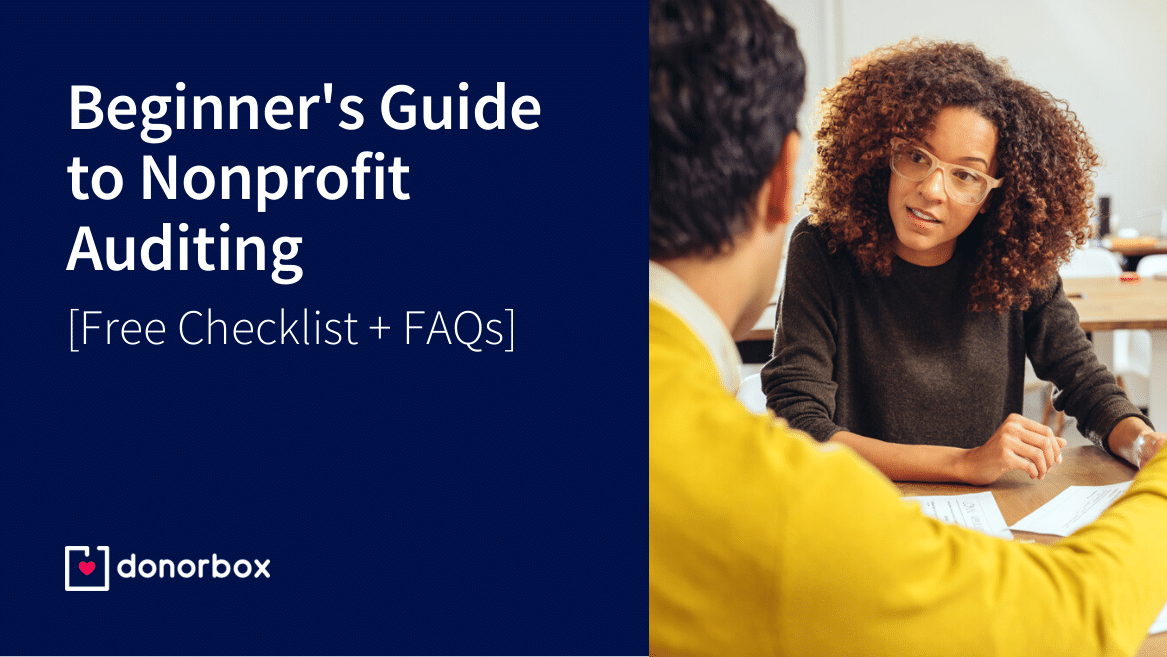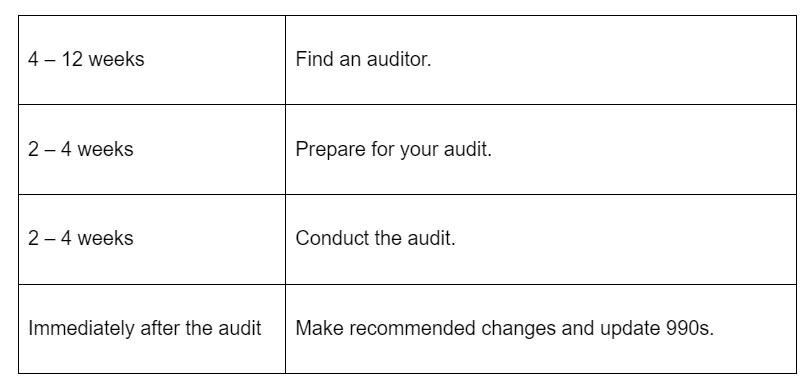
Auditing your nonprofit may send a wave of terror through your spine, but it doesn’t have to be as fear-inducing. There are a few reasons your nonprofit may need an audit, and if you’re taking the right steps and seeking expert help, your nonprofit auditing can be as easy as pie!
Also, regular audits can help your organization receive more funds by encouraging accountability and transparency with your donor base.
In this article, we’ll discuss different types of audits, the benefits to your nonprofit, and the steps you’ll need to take. We’ve also included a free nonprofit audit checklist to keep you on track.
- Nonprofit auditing – what does it mean?
- Different types of audits for nonprofits
- The 4 benefits of nonprofit auditing
- 5 Steps to prepare for a nonprofit audit
- Free nonprofit audit checklist
- Frequently asked questions [FAQs]
Nonprofit Auditing – What Does it Mean?
A nonprofit audit examines financial records, bank accounts, business transactions, accounting principles, and internal controls within a nonprofit organization.
There are several reasons your nonprofit may need to perform an audit. Some of these reasons come from external sources, but regular audits can also be an excellent long-term practice for your organization.
Different Types of Audits for Nonprofits
Nonprofits may be surprised when they realize that the request for a nonprofit audit may come from many sources. In addition to the IRS, there are a number of different organizations and the state government too can expect audit results from your nonprofit.
Let’s take a look!
1. IRS audit
Did you know the IRS is not the primary reason nonprofits must perform audits?
The IRS will audit your nonprofit if there are discrepancies in your tax reports, but instances of this are few and far between.
The IRS has two different types of audits.
1.1 Field audit
You may have seen a field audit on tv or in the movies. One or a group of IRS agents show up to your organization and begin to file through your financial paperwork.
This is one of the rarest experiences, and unless you’ve made a severe mistake, it is not likely to happen.
1.2 Office/Correspondence audit
An office or correspondence audit is more common than a field audit. But they are limited in scope.
You’ll receive a letter or phone call if the IRS does require an audit. This type of audit generally addresses issues with your tax return, discrepancies between your organization’s and freelancers’ or employee returns, or if a division of the IRS issues an IRS-wide examination.
2. Independent audit
Most nonprofit audits are independent audits. Some of these are required by other federal or state government organizations, foundations, or nonprofits themselves.
Let’s see the subtypes of this nonprofit auditing.
2.1 Federal
You must perform regular audits if your nonprofit receives federal funds through grants or other relationships. These audits focus on how you spend federal funds.
2.2 State
The federal government is not the only one that requires regular audits by nonprofits. One-third of all states in the US need nonprofits to perform regular audits if they solicit state residents.
2.3 Grants
Many foundations that provide grants to nonprofits also require audits.
If your nonprofit relies on grant funding, you’ve probably noticed that these organizations want financial reports that have been audited.
2.4 Bylaws
Finally, nonprofits that understand the benefits of audits will include this requirement in their organization’s bylaws, making this mandatory each year.
Nonprofits that do this will hire an auditor for a complete review of their financial records.
The 4 Benefits of Nonprofit Auditing

Adding an audit requirement to your organization’s bylaws may seem redundant for many nonprofits. The additional cost to perform these audits may even feel improbable, but there are several benefits for nonprofits that perform regular internal audits.
1. Funding
The first benefit has to do with grant funding. As we mentioned, many foundations and government organizations will want audited financial statements when applying for grants.
After you’ve received the grant, foundations may also ask for financial reports that show how the funds were used. By performing regular audits on your own, you’ll be prepared for these requests.
You can also share audited financial reports on websites like Charity Navigator, where many foundations search for organizations to fund.
2. Transparency
Donors appreciate transparency. By providing audited financial reports and annual reports on your website, you’re helping build trust with your donor base.
This trust will encourage donors to give more in the long run.
3. Accountability
Fraud cases can end your nonprofit. Regular audits will keep your Board of Directors and employees accountable for their decisions.
When auditing becomes a standard practice within your organization, your board, staff, volunteers, and donors understand their responsibilities and hold themselves and others accountable.
4. Improvements
A final benefit of regular internal audits is the knowledge they provide. Audits give your nonprofit an excellent overview of where you need improvements.
These improvements may involve fundraising opportunities you weren’t aware of and expenses you no longer need. An independent auditor can give your organization an outside perspective when you feel stuck.
5 Steps to Prepare for a Successful Nonprofit Audit
The steps we’ve included below will help you find an auditor and finalize your audit needs.
1. Build an audit committee
Time estimate – ASAP
Nonprofit boards should create committees to focus on needs like governance, fundraising, and finance.
An auditing committee is optional if you have a finance committee, but it may help your organization keep up to date with internal and external audit requirements.
Your board will give the auditing committee authority to oversee all audits, including hiring and evaluating an independent auditor.
2. Find an auditor
Time estimate – 4-12 weeks
The primary purpose of the auditing committee is to find an independent auditor. You must start working with an auditor early enough to meet external and internal deadlines. It’s recommended that you find and begin working with the auditor 4 to 12 weeks before the deadline.
Auditors must be Certified Public Accountants (CPAs). Your nonprofit can either use an individual CPA or find an auditing firm. Finding a CPA or firm that focuses on nonprofit audits to ensure their experience meets your organization’s needs is best.
During the research process, your auditing committee must have a clear idea of how long the audit will take and how much working with the auditor will cost. The best way to determine this for each option is by asking for a request for proposal (RFP).
An RFP should include the following information:
- Firm description.
- Information on who you will work with directly.
- What makes the firm or CPA stand out.
- Statement of the work the firm will provide.
- Fee structure.
- List of organizations they’ve worked with in the past.
You should also call references to help determine if they’ll be a good fit.
3. Prepare for your audit
Time estimate – 2-4 weeks
Once you’ve found an auditor, it’s time to get straight to work. Most auditors will send a Pull by Client (PCB) list of all the items they need before they begin, including the following –
- Bank reconciliations.
- Payroll information.
- Investment statements.
- Fundraising details.
- Schedule of prepaid items.
- Grants received.
4. Conduct the audit
Time estimate – 2-4 weeks
After they receive the items on the PCB list, your auditor will begin conducting the audit. Once it’s done, you’ll receive a letter from your auditor with a report discussing any issues they found and any recommendations they have for your organization.
5. After the audit
Time estimate – Immediately
Immediately after you receive the final auditor report, your nonprofit must begin making all suggested changes.
Once you’ve made these changes, you can send the audited information and modifications to the IRS to update your 990 forms.
Free Nonprofit Organization Audit Checklist
We’ve made the process easier for you by creating a free nonprofit audit checklist to keep handy for the right time or get started right away.
Click here to download for free.
Final Thoughts
Auditing does not have to be complicated or scary as it may seem. Since you’ll have plenty of time to plan for most audits, you can take time to research and prepare.
If you have any further questions about financial statements and accounting practices for nonprofits, we have published a number of such blogs on the Donorbox Nonprofit Blog. We also have guides on fundraising and donor management and plenty of nonprofit-related articles over there. Subscribe to our newsletter to receive a curated list of these resources in your inbox every month.
Donorbox is an all-in-one online fundraising platform for nonprofits of all sizes. Our simple-to-use and powerful features range from Donation Forms and Fundraising Pages to Recurring Donations, Crowdfunding, Peer-to-Peer, Events, Memberships, and more. You can also easily store and manage your donor and donation data on Donorbox. Our tool integrates with leading CRM tools to help you utilize this data to the max! Learn about our features and plans on the website.
Sign up to start fundraising in just 15 minutes – and boost your donations with Donorbox!
Frequently Asked Questions [FAQs]
1. What is the audit timeline?
Here’s what the ideal nonprofit auditing timeline looks like –

2. Who performs the audit?
Audits must be performed by a CPA (Certified Public Accountant) or an auditing firm. It’s best to find an auditor with expertise working with nonprofits.
3. When does the nonprofit audit become mandatory?
IRS usually never mandates the audit process for nonprofits. However, certain state and federal agencies will do that.
For example, if your nonprofit is based in California and you have a gross income of $2 million or more, you will be required to get annual audits.
Also, the federal Office of Management and Budget says that if your nonprofit spends $500,000 or more in federal funds in a year, you’ll have to get a single audit.
4. What are the state requirements for a nonprofit audit?
One-third of states in the US require regular audits for nonprofits that solicit funds from the state’s residents. Many states also require nonprofits to perform an audit when renewing their nonprofit registration once they reach a specific revenue.
5. How do I find an auditor?
Use Google to find at least three options (based on reviews and portfolios) for CPAs or auditing firms that work with nonprofits. Get a Request for Proposal (RFP) from each option.
Perform research to better understand the cost and time it will take to perform your audit. Bring this information to the board to make a final decision.
6. Who should be a part of the audit committee?
Your auditing committee should include at least one or more financial experts with knowledge of GAAP principles and financial reporting requirements.
Disclaimer: By sharing this information we do not intend to provide legal, tax, or accounting advice, or to address specific situations. The above article intends to provide generalized financial and legal information designed to educate a broad segment of the public. Please consult with your legal or tax advisor to supplement and verify what you learn here.






